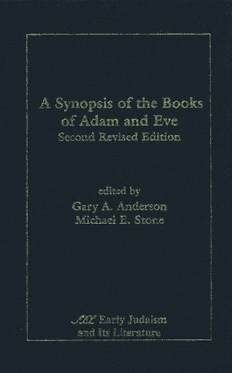Download A Synopsis of the Books of Adam and Eve: Second Revised Edition PDF Free - Full Version
Download A Synopsis of the Books of Adam and Eve: Second Revised Edition by Gary A. Anderson, Michael E. Stone in PDF format completely FREE. No registration required, no payment needed. Get instant access to this valuable resource on PDFdrive.to!
About A Synopsis of the Books of Adam and Eve: Second Revised Edition
This book compares five major groups of texts of the same pseudepigraphal book. This book is not appropriate for someone who has not read previous works containing or discussing the Pseudepigrapha of the Old Testament. This book does not describe the textual problems with the work; nor does it discuss how the work fits into Jewish or Christian literature. This book is purely intended to be source material, from which the reader can choose to draw his or her own conclusions about the work. This synopsis contains Greek, Latin, Armenian, Georgian, and Slavonic manuscripts of the book. There are major textual differences between these, coming from the book having passed through many hands, many of which had their own ideas to share. Additionally, there are differences within each group; the Latin texts are in four subgroups, and differences among them are marked in the book. The Greek and Latin texts are presented in the original tongues; the Armenian in an English translation; the Georgian in a French translation; and the Slavonic in a German translation. The commentary is entirely in English. Yes, if you do not have a reading knowledge of French, German, Latin, and Biblical Greek, then you will miss out on at least one of the variant texts. This alone means this book is not for the casual reader. It was fascinating, however, to see the problems that a serious scholar of ancient texts must face. It gave me a new understanding of the little footnotes on textual differences that one finds in a modern Bible. This book successfully does what it sets out to do (give the naked texts with bibliographic references to other studies that do analysis). The fact that this was not what I had expected when I bought it is not the author's fault. I did find that the notations used in the text -- to show differences within a particular language group of texts -- were not always clear and not fully explained. It may well be that they would have been clear for the scholars who are this book's intended audience.
Detailed Information
| Author: | Gary A. Anderson, Michael E. Stone |
|---|---|
| Publication Year: | 1999 |
| ISBN: | 788505661 |
| Pages: | 216 |
| Language: | English |
| File Size: | 11.406 |
| Format: | |
| Price: | FREE |
Safe & Secure Download - No registration required
Why Choose PDFdrive for Your Free A Synopsis of the Books of Adam and Eve: Second Revised Edition Download?
- 100% Free: No hidden fees or subscriptions required for one book every day.
- No Registration: Immediate access is available without creating accounts for one book every day.
- Safe and Secure: Clean downloads without malware or viruses
- Multiple Formats: PDF, MOBI, Mpub,... optimized for all devices
- Educational Resource: Supporting knowledge sharing and learning
Frequently Asked Questions
Is it really free to download A Synopsis of the Books of Adam and Eve: Second Revised Edition PDF?
Yes, on https://PDFdrive.to you can download A Synopsis of the Books of Adam and Eve: Second Revised Edition by Gary A. Anderson, Michael E. Stone completely free. We don't require any payment, subscription, or registration to access this PDF file. For 3 books every day.
How can I read A Synopsis of the Books of Adam and Eve: Second Revised Edition on my mobile device?
After downloading A Synopsis of the Books of Adam and Eve: Second Revised Edition PDF, you can open it with any PDF reader app on your phone or tablet. We recommend using Adobe Acrobat Reader, Apple Books, or Google Play Books for the best reading experience.
Is this the full version of A Synopsis of the Books of Adam and Eve: Second Revised Edition?
Yes, this is the complete PDF version of A Synopsis of the Books of Adam and Eve: Second Revised Edition by Gary A. Anderson, Michael E. Stone. You will be able to read the entire content as in the printed version without missing any pages.
Is it legal to download A Synopsis of the Books of Adam and Eve: Second Revised Edition PDF for free?
https://PDFdrive.to provides links to free educational resources available online. We do not store any files on our servers. Please be aware of copyright laws in your country before downloading.
The materials shared are intended for research, educational, and personal use in accordance with fair use principles.

